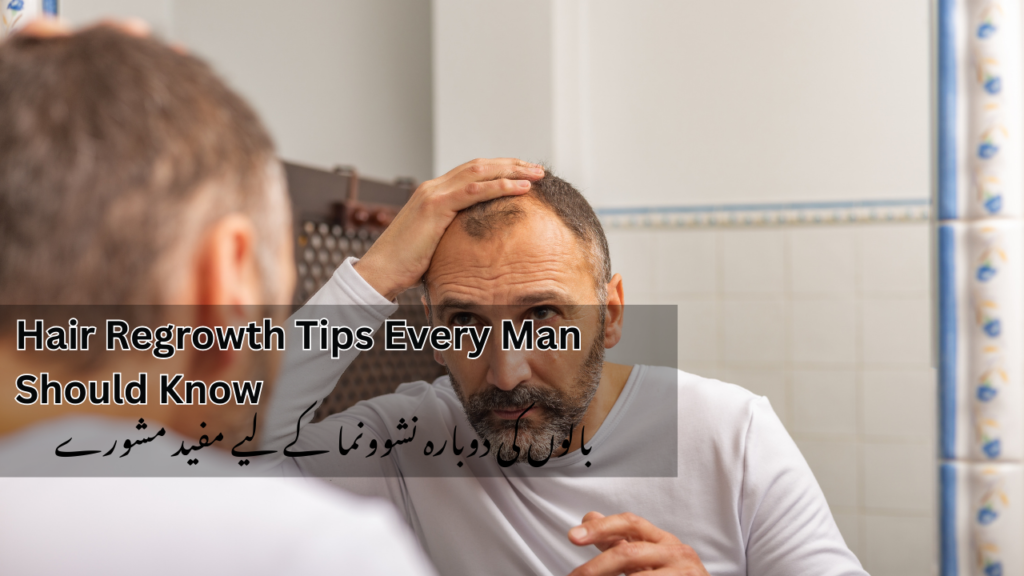Introduction
Hair plays a significant role in shaping a man’s appearance and confidence. However, hair loss is a common issue that affects millions of men worldwide. Understanding the causes and solutions for hair loss can help men take effective steps to maintain and regrow their hair.
Common Causes of Hair Loss
Genetic Factors
Genetics is one of the leading causes of hair loss. Male pattern baldness, known as androgenetic alopecia, often runs in families and typically starts with a receding hairline or thinning at the crown.
Hormonal Changes
Hormonal imbalances, such as an increase in dihydrotestosterone (DHT), can shrink hair follicles and lead to hair loss.
Lifestyle and Diet
Poor nutrition, stress, and unhealthy habits like smoking can weaken hair follicles and accelerate hair loss.
Hair Care Basics for Healthy Growth
Choosing the Right Shampoo
Opt for shampoos free of harsh chemicals like sulfates and parabens. Look for products containing ingredients like biotin and keratin for added strength.
Benefits of Regular Scalp Massage
Scalp massages improve blood circulation, which nourishes hair follicles and encourages growth. Using essential oils like rosemary or peppermint can enhance the benefits.
Avoiding Over-Styling and Heat Damage
Excessive use of styling tools, gels, and heat can damage hair strands and weaken follicles. Use heat protectants and minimize styling to maintain hair health.
Foods That Promote Hair Growth
Protein-Rich Foods
Hair is primarily made of protein, so consuming eggs, lean meats, dairy, and legumes can strengthen hair and promote regrowth.
Vitamins and Minerals for Hair
Biotin, iron, and zinc are essential for hair health. Incorporate foods like nuts, seeds, spinach, and fortified cereals into your diet.
Effective Hair Treatments
Over-the-Counter Solutions
- Minoxidil: A topical solution that stimulates hair growth and slows hair loss.
- Finasteride: An oral medication that blocks DHT and reduces hair loss.
Natural Remedies
- Aloe Vera and Coconut Oil: These soothe the scalp and provide hydration.
- Onion Juice: Rich in sulfur, it strengthens hair and stimulates growth.
Lifestyle Changes to Boost Hair Health
Managing Stress Effectively
Chronic stress can lead to hair loss. Practice relaxation techniques like meditation and yoga to reduce stress levels.
Importance of Adequate Sleep
Hair regrowth happens during the body’s repair cycle, which occurs during sleep. Aim for 7-8 hours of quality sleep each night.
Exercise and Its Role in Circulation
Regular physical activity improves blood flow to the scalp, ensuring hair follicles receive essential nutrients.
Myths About Hair Loss
Debunking Common Hair Loss Myths
Contrary to popular belief, wearing hats or washing hair frequently does not cause hair loss. Focus on evidence-based practices for better results.
Understanding What Really Works
Stick to treatments backed by scientific research to achieve lasting results.
Advanced Hair Regrowth Techniques
Hair Transplant Surgery
A permanent solution for bald spots, this procedure involves transplanting hair follicles from one area to another.
Platelet-Rich Plasma (PRP) Therapy
This innovative treatment uses your own blood to stimulate hair growth.
Laser Therapy
Low-level laser devices boost circulation and encourage hair regrowth.
Supplements for Hair Regrowth
Importance of Biotin and Collagen
These nutrients strengthen hair strands and promote elasticity.
Omega-3 Fatty Acids
Found in fish and flaxseeds, these fatty acids reduce inflammation and support scalp health.
Multivitamins for Overall Health
A daily multivitamin can fill nutritional gaps and support hair health.
Scalp Health and Its Impact on Hair Growth
Keeping the Scalp Clean
Regular washing prevents buildup of dirt and oil, which can clog follicles.
Importance of Exfoliation
Scalp scrubs help remove dead skin cells, promoting a healthy environment for growth.
Hydration and Moisture
Use moisturizing products to keep the scalp hydrated and prevent dryness.
Avoiding Common Mistakes
Overwashing Hair
Frequent washing can strip natural oils. Wash hair 2-3 times a week with a gentle shampoo.
Neglecting Early Signs of Hair Loss
Address hair loss early with appropriate treatments to prevent further thinning.
Using Harsh Chemicals
Avoid products with harsh chemicals that can damage hair and scalp.
Role of Genetics in Hair Loss
Understanding Male Pattern Baldness
Genetics play a crucial role in male pattern baldness. Identifying early signs can help in managing the condition.
Can Genetics Be Overcome?
While genetics cannot be altered, treatments and lifestyle changes can slow the progression of hair loss.
Styling Tips for Thinning Hair
Choosing the Right Haircut
Shorter hairstyles can make thinning less noticeable and give a fuller appearance.
Using Volumizing Products
Lightweight products can add volume and texture to thinning hair.
Avoiding Heavy Styling Gels
Avoid products that weigh down hair or make it appear greasy.
When to Seek Professional Help
Recognizing Severe Hair Loss
If hair loss is rapid or severe, consult a professional for diagnosis and treatment.
Consulting a Dermatologist
Dermatologists can recommend tailored treatments for hair regrowth.
Exploring Hair Clinics
Hair clinics offer advanced treatments like transplants and PRP therapy.
Building a Personalized Hair Care Routine
Assessing Your Hair Type
Understanding your hair type helps in choosing suitable products and routines.
Customizing Your Products
Use products designed for your specific hair and scalp needs.
Sticking to a Consistent Routine
Consistency is key to seeing noticeable improvements in hair health.
Conclusion
Hair regrowth requires a combination of proper care, lifestyle adjustments, and effective treatments. By following these tips, men can take charge of their hair health and regain confidence.
FAQs
What are the first signs of hair loss in men?
A receding hairline and thinning at the crown are common early signs.
Can stress really cause hair loss?
Yes, chronic stress can lead to hair loss by disrupting the hair growth cycle.
How effective are natural remedies for hair growth?
Natural remedies can support hair health but may not be as effective as medical treatments.
Is it possible to regrow hair on a bald spot?
It depends on the cause. Treatments like PRP and hair transplants can be effective for some cases.
How long does it take to see results from treatments?
Results vary but typically take 3-6 months for noticeable improvements.


